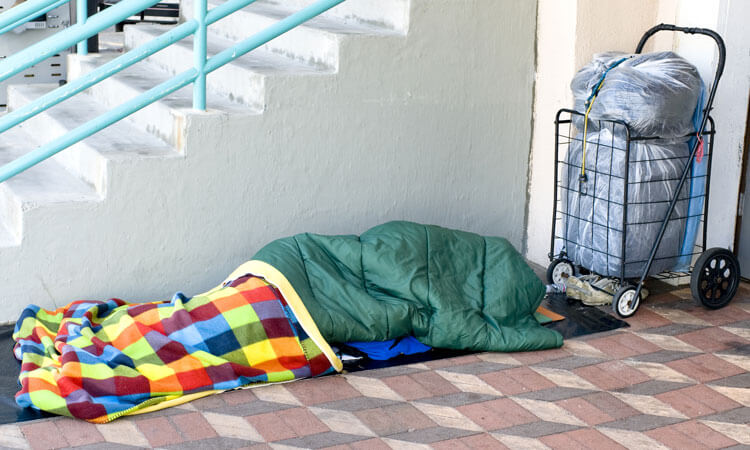
Advice on interactions with people experiencing homelessness
Lifewise is a member of The Methodist Alliance and together, we believe that all people have the right to a safe, warm and affordable home. Homelessness should never be an acceptable societal norm. With collective action, homelessness should be rare, brief and non-recurring.
For some people, homelessness means sleeping rough on the street or living in cars. For others, it could involve couch-surfing or house-jumping with friends or acquaintances.
Homelessness is a symptom of disadvantage, with Maori, those who have been in care, and children growing up in poverty, more likely to experience homelessness than the general population. Many people experiencing homelessness have a multitude of challenges and very few natural supports. Many are disconnected from government services and have no formal financial support.
1. Open a dialogue with the person – offer them a cup of tea and talk with them about what their needs are. If you feel comfortable offer to accompany them to W&I, your beneficiary advocates, local MP, or the local Methodist mission to get further support.
2. Many cities have a Housing First programme, so link the individual with a Housing First provider, if there is one in your area. Lifewise, Wesley Community Action & Christchurch Methodist Mission are all Housing First providers.
3. Almost all homeless people are also facing addiction or mental health issues. Do what feels comfortable for you and your staff. If you are not comfortable, contact your local council and ask for advice or help from homeless services – some councils have an outreach team.
4. Compile a list of local resources in your area for people experiencing homelessness. You may be able to direct them to the nearest night shelter, emergency housing providers, housing support organisations, or other community resources such as soup kitchens. Keep a list of phone numbers, contacts, night shelters, refuges, food banks, where and when community meals are provided, and helplines.
Your local council may have a free directory of services including accommodation for people without a safe and secure home:
- https://www.ccc.govt.nz/assets/Uploads/NoFixedAbodeDirectory-docs.pdf
- https://wellington.govt.nz/~/media/services/community-and-culture/housing/files/need-a-hand-map.pdf
- http://www.awhina.net.nz/
Assist the person to access support, try to stay alongside them until they engage with another agency.
5. If you are concerned about someone’s immediate health, take action. Call 111 if the person is clearly unwell and unresponsive. If the person is cogent but you are concerned for their wellbeing, ask them if you can call an ambulance for them. Offer people 1737 – free call or text any time for people to connect with mental health & addiction professionals.
6. Create blessing bags and have them on hand. Blessing bags include small items that make homelessness a tiny bit easier for the individual, such as socks, toothpaste, crackers, a bottle of water, comb, sunscreen, lip balm. Pop them all in a zip lock bag as it helps to keep the items from spilling or leaking into their own personal items and can be used again. Some ideas and a checklist with notes of encouragement can be found here: https://www.thriftynorthwestmom.com/wp-content/uploads/2018/07/Blessing-Bag-PACKING-LIST.pdf
7. Talk to the professionals: contact your local Methodist Mission for information on housing and other support.
- Lifewise (Auckland) – lifewise@lifewise.org.nz or 09 302 5390
- Methodist City Action (Hamilton) – maxine@hmss.org.nz or 07 839 3917
- Palmerston North Methodist Social Services – 06 350 0307 or manager@methodistsocialservices.org.nz
- Wesley Community Action (Wellington) – info@wesleyca.org.nz or 04 385 3727
- Christchurch Methodist Mission – info@mmsi.org.nz or 03 375 1470
- Methodist Mission Southern (Dunedin) – admin@mmsouth.org.nz or 03 466 4600
Homelessness is a complex issue. Here are some facts:
- Domestic violence is a leading cause for homelessness among women
- One in five people who are homeless have an untreated mental illness
- 40% of youth who are homeless often identify as LGBTQI+
- Many people are homeless because they cannot afford to pay rent as the housing crisis forces up prices
- Homelessness is extremely harmful to people’s wellbeing and health.
- Sleeping rough shortens lifespan by 30 years
- Many people who are homeless have experienced significant trauma in their childhood or early adult years.
There are some big myths about the homeless out there, all of which, we can put right.
Don’t people choose to be homeless?
We have not yet met any homeless people who truly wanted to live on the street. Living on the street is dangerous. Homeless people are often abused and attacked, discriminated against and alienated. They are often sleep-deprived, under-nourished and unwell. It’s cold, dirty and humiliating living on the street. Many are there because they simply cannot see another way of dealing with things. Every one of the homeless people we work with wants a home. Most also want to work.
Don’t people need an address to get a benefit?
Every person correctly registered with Work and Income can receive a benefit. Part of the Housing First approach is making sure everyone is receiving their entitlement. However, many people are living on less than $100 a week. Many have overwhelming debts and fines.
Aren’t all beggars homeless?
Worldwide it is recognised that the majority of beggars are not homeless. The public needs to know that when people are begging and saying they’re homeless, that’s not necessarily accurate.
Homelessness can’t be fixed, can it?
There are communities worldwide who are close to ending homelessness. They have done this by adopting the Housing First model and focusing on ending homelessness rather than managing it. They have done this by collaborating across communities and co-ordination of mostly existing community resources. Developing a stock of safe, affordable housing has been the key to the success of Housing First.

